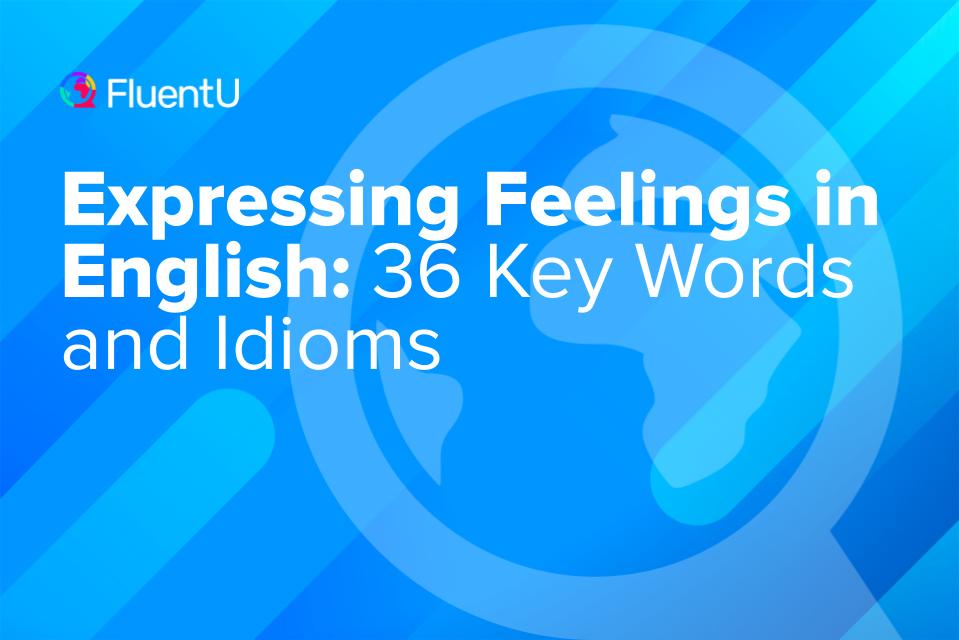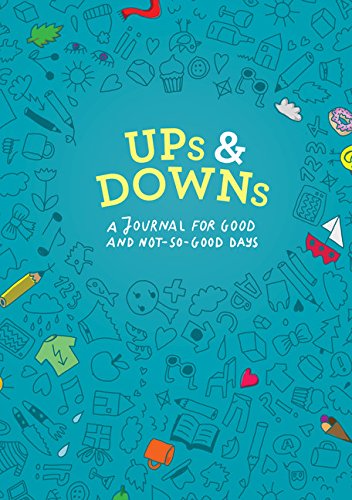Expressing Feelings in English: 36 Key Words and Idioms

At times, both native English speakers and language learners can find it difficult to answer such a simple question—how are you really feeling? Finding the right words and phrases to express your feelings in English is not always easy, especially if you are still learning the language.
In this post, I will help you express all kinds of feelings in English that way the next time someone asks you how you are feeling; you will be able to answer.
Download: This blog post is available as a convenient and portable PDF that you can take anywhere. Click here to get a copy. (Download)
English Words for When You Are Feeling Good
If you are in a good or positive mood, there is a high chance that you are feeling one of the following emotions.
1. Glad
Meaning: To feel glad means you are feeling joyful, delighted or pleased.
You will likely feel glad when you have received some good news or something positive has happened in your life.
Rita was glad when she found out that she had passed her English exam.
2. Content
Meaning: To feel content means that you are satisfied or happy with how things are, and you do not need anything more.
He is content living in his hometown because his whole family and his best friend live there too.
3. Elated
Meaning: Elated is when you feel very happy about something—it is more than the average level of happiness.
You may feel elated if the boy you like finally asks you on a date or when all your hard work has finally paid off. Another word that you can use is overjoyed .
I was elated when I won $100 for first place in the art competition.
4. Ecstatic
Meaning: If elated was to be very happy, then to feel ecstatic is to be very very happy. It is the maximum amount of happiness that you can feel.
When you are ecstatic, you are filled with an intense (deep) sense of joy.
Maria was ecstatic when she found out her parents were taking her to Paris this summer.
5. Excited
Meaning: To be excited about something is to really look forward to it with joy.
She was excited to finally see her cousins after spending the summer abroad.
6. Eager
Meaning: You may feel eager as you wait for something to happen or look forward to something happening. When you are eager, you might also be more motivated to make something happen.
Rowena is so eager to learn English that she practices her speaking skills every day.
7. Proud
Meaning: Feeling proud of yourself might happen when you have worked really hard at something, and the end result was very positive.
I worked on that painting for two months, and I was very proud of how well it turned out.
8. Tranquil
Meaning: To feel tranquil is to feel peaceful and calm.
I felt very tranquil after walking along the beach at sunrise.
9. Hopeful
Meaning: To be hopeful means you want something to happen, and you think there is a high chance that it will happen.
10. Confident
Meaning: If you are feeling confident, it means you believe in yourself and your abilities. You are sure about who you are and what you can do.
Jeet was pretty confident that he did well in the job interview.
11. Loved
Meaning: You feel loved when you know someone cares for you and wants the best for you.
English Words for When You Are Feeling Down
Is something bothering you or are you in a bad mood? The words below might help you express those feelings.
12. Sad
Meaning: When something bad or unfortunate happens in your life, you will probably feel sad or unhappy.
She was sad when she heard that her best friend was moving out of town.
13. Depressed
Meaning: If you feel very sad and that sadness persists (stays) for a while, you might say that you are feeling depressed. Note that depression is an actual mental illness that you can be diagnosed with, but some English speakers use it to describe extreme sadness (like responding to something very upsetting with “That’s depressing”).
After her husband’s death, Rey was depressed for years.
14. Disgusted
Meaning: You feel disgusted when you really dislike something or it makes you feel sick.
Harry was disgusted when he saw a lizard drinking from his glass of water.
15. Guilty
Meaning: You will likely feel guilty if you have done something wrong, such as making someone else feel bad.
Martha felt very guilty for shouting at the shopkeeper.
16. Hurt
Meaning: Hurt is when you feel bad and are in pain, either mentally or physically.
He was very hurt when his parents forgot his birthday.
17. Lonely
Meaning: If you are sad and alone, chances are you are feeling lonely. You can also feel lonely in a room full of people if you cannot relate or connect to anyone. In the second case, you might also feel alienated.
After his girlfriend broke up with him, he was feeling very lonely.
18. Angry
Meaning: You might become angry when something does not go your way, or someone does something mean or wrong toward you.
The captain of the ship was angry at the sailors for disobeying his orders.
19. Jealous
Meaning: You may feel jealous of someone when they have something that you want but do not have. Another word for jealous is envious .
Joe and Ben stopped being friends because Ben was too jealous of Joe’s successful acting career.
20. Scared
Meaning: To feel scared is to be full of fear and worry. You can be scared of anything from spiders to flying in an airplane.
She was very scared to swim in the lake after she saw a big snake near the water.
21. Anxious
Meaning: When you think something bad might happen, or you are uncertain about a situation, you might start to feel anxious.
While my brother was in the hospital, I was so anxious that I could not sleep.
Other Common Feelings in English
Doesn’t it feel wonderful when you discover (find out) that there is a perfect word to express exactly what you are feeling? Well, here are some more common feelings that we experience, along with the right words for them.
22. Confused
Meaning: You know that feeling when you do not know right from wrong? Or everything appears unclear and uncertain, and you do not know what to do? That is called being confused.
The topic was very challenging, and the professor’s lesson confused me even more.
23. Surprised
Meaning: You may feel surprised when something unexpected (not planned) or out of the ordinary happens.
She felt so surprised when her boyfriend brought home a puppy.
24. Curious
Meaning: You may feel curious when something interests you, and you want to learn or know more.
Brad was curious about what was in the closet that his parents always kept locked.
25. Bored
Meaning: You might feel bored when you have nothing to do, or you are not interested in something.
I felt so bored watching that movie that I fell asleep.
26. Nostalgic
Meaning: If you think about something that happened in the past and you wish you could return to that former time (even though you know it is impossible), you are feeling nostalgic.
27. Indifferent
Meaning: You are indifferent to something if you feel neither good nor bad about it. If you are indifferent, you do not care about something or have any interest in it.
28. Strange
Meaning: You can use the word strange to describe a feeling that is unusual or different from how you normally feel.
I felt strange when I walked into the party, and everyone just stopped talking.
29. Ambivalent
Meaning: To feel ambivalent is when you have mixed (good and bad) feelings about an issue, or you cannot choose between two different options.
30. Baffled
Meaning: If you are absolutely confused or you can see no way of solving an issue, you are feeling baffled.
31. Pensive
Meaning: If you are thinking deeply about something, you are in a pensive or thoughtful mood.
32. Wistful
Meaning: To feel wistful is to find yourself in deep thought but in a sad or depressing way.
After the car accident, she felt wistful for weeks.
Common English Idioms to Describe Your Emotions
33. To feel down
Meaning: To feel down is an idiomatic way of saying that you are sad.
After hearing the bad news, I was feeling down, but my friends came over to cheer me up.
34. To feel blue
Meaning: Like the idiom listed above, to feel blue also means to feel sad.
He’s been feeling blue ever since he came back home from Australia.
35. To be over the moon
Meaning: To be very happy.
She was over the moon when she saw her childhood friend after so many years.
36. To see red
Meaning: To be very angry.
His face suddenly changed and he began to see red.
For more words and idioms to express emotions in English, this lesson from our YouTube channel covers lots of different emotions.
Learn to Describe Your Feelings in English With These Tips and Resources
Here are some useful tips and resources that can help you start talking and writing about your feelings with confidence!
Learn words for emotions with children’s songs
One cool way to learn the words for different feelings is to listen to children’s songs on YouTube.
Once you memorize the lyrics (words of a song), you will realize you have memorized the vocabulary too. Check out these feeling-focused songs by Dream English Kids and Fun Kids English.
Immerse yourself in native English content
Your vocabulary practice doesn’t have to stop at children’s songs. You will get some great practice by immersing yourself in other English content, like TV shows, movies or even popular songs. With these everyday English resources, you will be able to see a ton of this vocabulary in use.
Another useful resource for consuming native media with some extra language support is a language learning program like FluentU.
FluentU takes authentic videos—like music videos, movie trailers, news and inspiring talks—and turns them into personalized language learning lessons.
You can try FluentU for free for 2 weeks. Check out the website or download the iOS app or Android app.
P.S. Click here to take advantage of our current sale! (Expires at the end of this month.)

Keep a mood diary to track your feelings
As well as practicing these words with authentic content, you can also make it a habit to write down your feelings in a diary (notebook).
Every day, write down a few sentences about how you are feeling right now. If you do not know the right words, try to describe your mood in as much detail as possible with the words you do know.
Another useful way to get writing practice and identify any gaps in your vocabulary is by writing as much as you can in English while writing any terms you do not know in your native language in pencil, so you can look for the translation in a dictionary later on.
A mood diary will not only help you improve your writing skills but it’ll also teach you to separate one feeling from another.
While there are hundreds of words in the English language to label and describe feelings, the ones you just learned in this post should help you to start expressing your feelings today!
Download: This blog post is available as a convenient and portable PDF that you can take anywhere. Click here to get a copy. (Download)
And One More Thing...
If you like learning English through movies and online media, you should also check out FluentU. FluentU lets you learn English from popular talk shows, catchy music videos and funny commercials, as you can see here:
The FluentU app and website makes it really easy to watch English videos. There are captions that are interactive. That means you can tap on any word to see an image, definition, and useful examples.
For example, when you tap on the word "searching," you see this:
Learn all the vocabulary in any video with quizzes. Swipe left or right to see more examples for the word you’re learning.

FluentU helps you learn fast with useful questions and multiple examples. Learn more.
The best part? FluentU remembers the vocabulary that you’re learning. It gives you extra practice with difficult words—and reminds you when it’s time to review what you’ve learned. You have a truly personalized experience.
Start using the FluentU website on your computer or tablet or, better yet, download the FluentU app from the iTunes or Google Play store. Click here to take advantage of our current sale! (Expires at the end of this month.)











